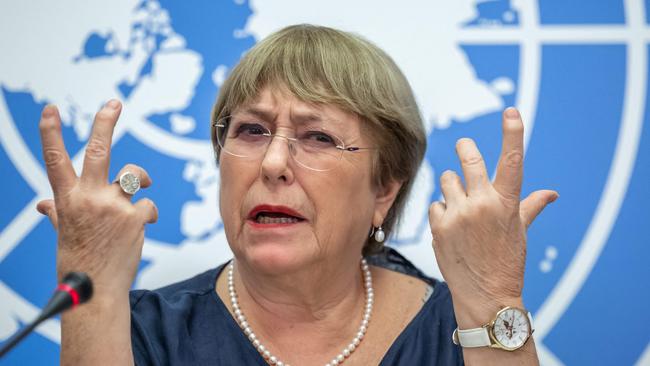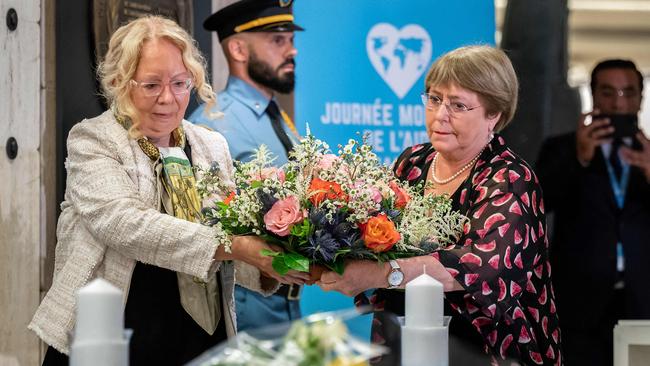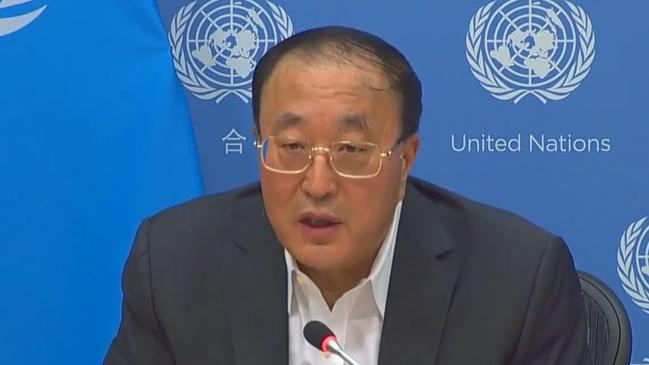UN human-rights agency issues report on Xinjiang over China’s protest
The United Nations human-rights agency report says torture allegations are credible and cites possible crimes against humanity that often targeted ethnic Uyghurs.

The United Nations human-rights agency on Wednesday alleged “serious human-rights violations” in the Chinese region of Xinjiang that often targeted ethnic Uyghurs and other members of Islamic groups, in a report that broadly supports critical findings by Western governments, human-rights groups and media.
The findings were contained in a long-awaited report by the U.N. agency that quoted what it described as former detainees of internment camps in Xinjiang with “credible” accounts of torture and other forms of inhuman treatment between 2017 and 2019, including some instances of sexual violence. The UN body said detainees had no form of redress.
The UN agency said what it termed arbitrary detentions in Xinjiang stemmed from a system of antiterrorism laws in China “that is deeply problematic from the perspective of international human-rights norms and standards.” It also alleged people are detained for religious practices.
It said the extent of arbitrary and discriminatory detention of members of Uyghur and other predominantly Muslim groups “may constitute international crimes, in particular crimes against humanity.”

The report cited descriptions of possible forced labor associated with the camps, including labor and employment schemes for the purported purposes of poverty alleviation and the prevention of “extremism.”
The UN body urged Chinese authorities to take “prompt steps to release all individuals arbitrarily deprived of their liberty” in Xinjiang and to undertake “a full review of the legal framework governing national security, counterterrorism and minority rights,” as well comply with international conventions on forced labor.
The findings largely support allegations in recent years from Western governments, human-rights groups and media organizations that have triggered widespread condemnation of Beijing and support for the Uyghur cause.
The US has alleged genocide in Xinjiang—the 48-page U.N. report doesn’t contain the word—and sanctioned Chinese officials it blames for the alleged human rights abuses. The US has also banned imports of most products produced in Xinijang, such as cotton.
The U.N. report contained an annex published by China’s Permanent Mission to the U.N. that said China firmly opposed the release of the report and said it was based on disinformation by anti-China forces. China argues that it has undertaken vocational training efforts in Xinjiang to diffuse risks of terrorism and to alleviate poverty, and that critics ignore improvements in living standards delivered by the government.
The report was delivered hours before the end of a four-year term by the agency’s high commissioner for human rights, Michelle Bachelet, and emerged despite strong objection by Beijing.
Since taking office in September 2018, Ms Bachelet, the former president of Chile, has led an effort by the UN rights agency to assess claims of rampant abuses in China’s northwestern region of Xinjiang, where researchers have documented a withering Communist Party campaign to forcibly assimilate ethnic Uyghurs and other Muslim minorities.
Ms Bachelet’s office pledged to issue its findings in a report, which became the subject of contention as US officials and rights watchdogs accused the UN of delaying its release, while Beijing lobbied against its publication.
Human-rights groups applauded the report’s release, expressing hope it will generate a strong response from UN member states and international corporations.
“The High Commissioner’s damning findings explain why the Chinese government fought tooth and nail to prevent the publication of her Xinjiang report, which lays bare China’s sweeping rights abuses,” said Sophie Richardson, China director at Human Rights Watch, in a statement after the report’s release.
“This is a game-changer for the international response to the Uyghur crisis,” Uyghur Human Rights Project Executive Director Omer Kanat said in a statement.
Among those held in Xinjiang is Uyghur intellectual Ilham Tohti who in 2014 was jailed for life on charges of separatism; on Wednesday, his U.S.-based daughter Jewher Ilham said she welcomed the UN report but that it brings her “little comfort” because she believes her father was jailed on charges he didn’t deserve and that she has had no contact with him for nine years.
Ms Bachelet said in September 2021 that her office was “finalizing” its assessment of alleged rights violations in Xinjiang. The U.N. rights agency continued working on the report as it arranged a China visit for Ms Bachelet, who traveled to Xinjiang and the southern city of Guangzhou in late May—the first China visit by a UN high commissioner for human rights since 2005.
.In accordance with standard practice, whereby the UN rights agency provides copies of country-specific reports to the government in question before publication, Ms Bachelet’s office shared its Xinjiang assessment with the Chinese government to seek comment. Last week, she told reporters that she has received “substantial input” from Beijing that her office must “carefully review.”
Xinjiang, a swath of desert and mountains abutting Central Asia, is home to roughly 14 million Turkic-speaking Uyghurs and other Muslim minorities. Rights activists and scholars estimate that Chinese authorities in the region have funnelled more than a million people through internment camps, while implementing political indoctrination, forced labor, family separations, strict birth controls and restrictions on religious practices that target Uyghur and other Muslim communities.
The US State Department and lawmakers in Canada, the UK, and France have argued that China’s actions in Xinjiang amount to a form of genocide. An independent, UK.-based panel of lawyers, academics and activists came to the same conclusion in December following a yearlong investigation.

Agricultural and industrial supply chains involving Xinjiang are under new scrutiny because the region is a major producer of cotton, tomatoes and chemicals used in high-technology applications like solar cells. Concerns about Xinjiang were a basis for the Biden administration and some other Western governments to diplomatically boycott this year’s winter Olympics in Beijing.
Beijing has denied committing rights violations in Xinjiang, calling genocide allegations “the lie of the century.”
“We firmly oppose the release of a so-called Xinjiang-related report,” Chinese Foreign Ministry spokesman Zhao Lijian told reporters on Wednesday ahead of the report’s publication. “The report is a pure stunt orchestrated by the U.S. and a handful of other Western countries.”
Chinese leader Xi Jinping has said that the party’s policies in Xinjiang are “completely correct” and that they helped restore stability to a region once racked by ethnic violence and deadly attacks against symbols of Beijing’s authority. He visited the region in July.

Critical findings of China from the UN contrast with Beijing’s growing rhetorical and financial support for the world body, which Mr Xi has said better represents world opinion than organizations like the Group of Seven that it says are controlled by Washington.
The report didn’t estimate how many people were held in Xinjiang but referred to a separate 2018 UN agency estimate that detainees numbered in the tens of thousands to over a million. It said Beijing responded to those estimates at the time by saying detainees, which it says are undergoing “re-education,” come and go so total figures aren’t available.
Ms Bachelet had pledged to release the report before her four-year term as high commissioner expired. The former Chilean president, who turns 71 in September, made the commitment while announcing that she wouldn’t seek a second term, citing personal reasons, amid criticism from Western officials and activists that her China visit had played into Beijing’s narratives about its rights record.
The UN has yet to announce Ms. Bachelet’s successor.
In July, Beijing said nearly 1,000 nongovernmental organizations in China and elsewhere signed a letter urging Ms Bachelet not to release the Xinjiang report, saying its publication would be used as “an excuse to interfere in China’s internal affairs,” while undermining the U.N. rights agency’s reputation.
Ms Bachelet said last week that she also received a letter signed by about 40 or so countries urging her not to issue the report. “I have been under tremendous pressure, to publish or not to publish, but I will not publish or withhold publication due to any such pressure. I can assure you of that,” Ms Bachelet told reporters. “Our work is guided by human-rights methodology and the facts on the ground, and objective legal analysis.”
The assessment issued by Ms Bachelet’s office came on the heels of a separate set of findings from a UN Special rapporteur on contemporary slavery, who wrote a report—dated July—saying that he found it “reasonable to conclude” that forced labor was taking place in Xinjiang.
The rapporteur, legal scholar Tomoya Obokata, cited an independent assessment of information that included academic research, victims’ testimonies and government accounts. A Chinese Foreign Ministry spokesman rejected Mr Obokata’s claims and accused him of trying to “malignly smear and denigrate China”.
Wall Street Journal







To join the conversation, please log in. Don't have an account? Register
Join the conversation, you are commenting as Logout